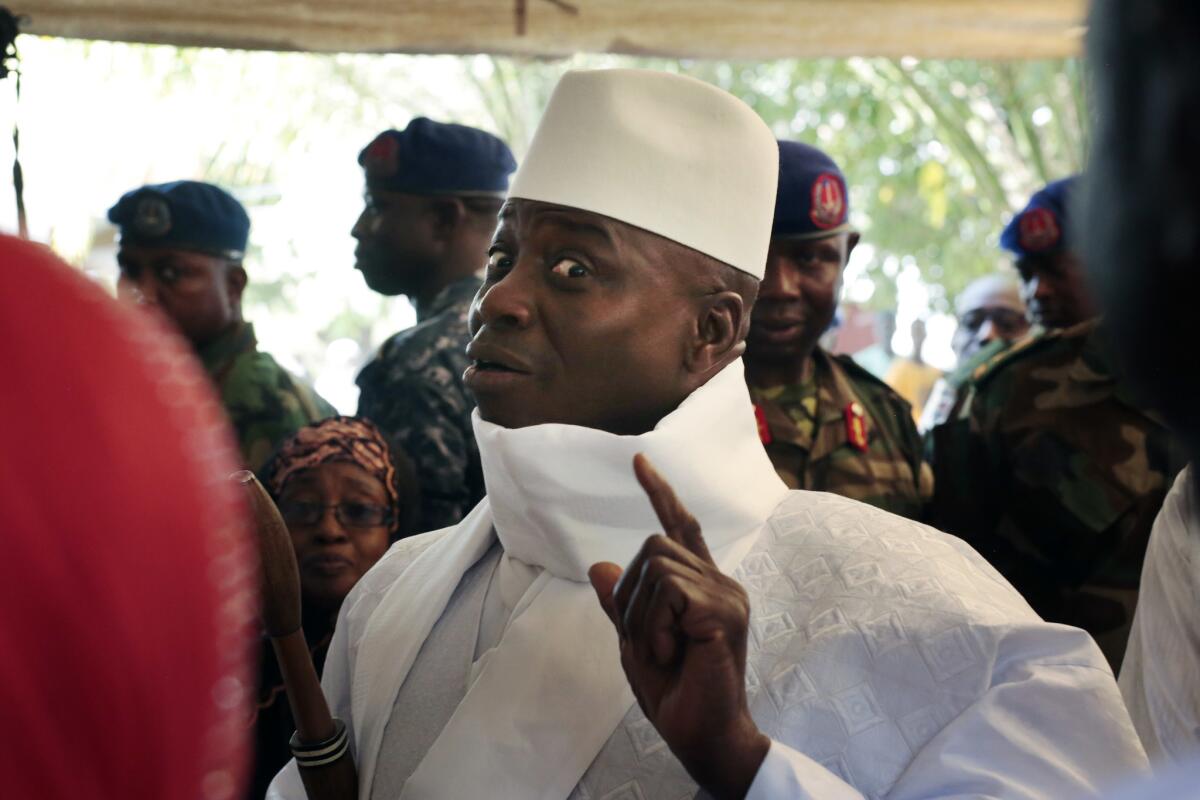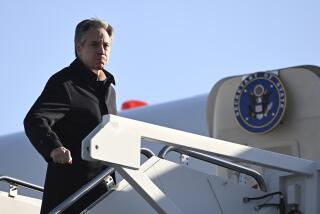Defeated dictator clings to power in Gambia as African leaders mull how to save democracy

Reporting from Johannesburg, South Africa — Yahya Jammeh has ruled a tiny slice of West Africa for 22 years, but his refusal to step down Wednesday after his defeat in last month’s elections in Gambia has created an outsized headache for regional leaders.
Jammeh was supposed to leave office to pave the way for Thursday’s inauguration of President-elect Adama Barrow, but parliament voted to extend his term for 90 days, testing the resolve of West African leaders who have threatened to send in a military force to oust him if he doesn’t go.
For the record:
11:44 p.m. Aug. 23, 2019An earlier version of this article said that Africa has seen a string of failed power-sharing deals, including in Zimbabwe after disputed elections in 2009 and in Kenya after disputed elections in 2007-2008. The disputed elections in Zimbabwe and Kenya were in 2008 and 2007, respectively.
Jammeh declared a state of emergency late Tuesday, enabling him to rule by decree and detain people without charge, but Barrow has vowed that he will be inaugurated Thursday, setting the scene for a tense standoff.
Democracy has taken root in West Africa more deeply than anywhere else on the continent, making the crisis in Gambia all the more troubling.
Jammeh, so enamored of his own powers that he claimed to be able to “cure” people of AIDS and other ailments with an herbal concoction of his own creation, initially accepted defeat in the Dec. 1 elections. After a few nights’ sleep, he changed his mind, backed by the commander of the army.
He mounted a legal challenge against the results and sought an injunction preventing the inauguration from taking place Thursday. He also has shut down several media outlets in recent weeks.
Barrow is in neighboring Senegal, due to return for the ceremony. The chief electoral officer, Alieu Momarr Njai, fled to Senegal.
Barrow portrayed confidence Wednesday tweeting, “Our future starts tomorrow,” but international tour agencies evacuated British and other European tourists as tensions rose in the capital, Banjul.
The African Union and the Economic Community of West African States (ECOWAS) have warned that they will not recognize Jammeh as president after Thursday.
ECOWAS leaders have been trying to persuade Jammeh to step down, offering him immunity from prosecution for human rights abuses and asylum in Nigeria or Morocco.
ECOWAS is strong on defending democratic transitions of power in comparison with other African leadership bodies, because many West African leaders are former opposition figures who came to power through democratic votes.
The big question is whether ECOWAS is willing to invade Gambia to remove Jammeh from power. Nigerian officials confirmed that they have contributed 200 troops to a standby force, with Senegal and Ghana also sending troops, the Associated Press reported.
About 26,000 people have fled the country, fearing violence, Reuters reported.
Gambia, a narrow country about three-quarters the size of Connecticut, is a former British colony situated on the Gambia River delta. Jammeh seized power in a 1994 coup and once said he would rule for a billion years. Always clad in white, he is accused by human rights organizations of persecuting and jailing his opponents and critics. Before last year, he had won a series of elections that was not regarded as free or fair by international observers.
Barrow ran for office in last month’s election vowing to respect human rights and to end disappearances and imprisonment without trial.
Jammeh’s attempts to use the courts to hang on to power ran into trouble because of the lack of judicial expertise in Gambia. Nigerian judges were to hear his case, but none were available until May.
He insists that the inauguration cannot proceed until his court action is heard.
On Sunday, Jammeh telephoned the chairwoman of ECOWAS, Liberian President Ellen Johnson Sirleaf, to say the Jan. 19 inauguration was “not set in stone,” and that the only way to settle the crisis peacefully was to allow his court challenge to be heard.
Without telling her, Jammeh televised the conversation on Gambia’s state station. An infuriated Johnson Sirleaf said Monday that ECOWAS had not changed its position.
“The constitution of the Gambia must be respected,” she said in a radio interview. “There was an election. That election was won by the head of the opposition team and he [Jammeh] needs to respect that. That’s the position of ECOWAS.”
The regional group has opposed the negotiated power-sharing agreements that the continent-wide body, the African Union, often endorses to settle disputed elections. The presidents of members Nigeria, Liberia, Ghana, Senegal and Ivory Coast rose to power through democratic elections.
Power-sharing agreements are sometimes seen as a way to prevent violent conflict, but critics see the deals as an incentive for leaders who lose to dispute the results, play for time and ultimately cling to power. Africa has seen a string of failed power-sharing deals, including after disputed elections in Zimbabwe in 2008 and in Kenya in 2007 and after a leadership struggle in South Sudan that led to civil war in 2013.
Twitter: @RobynDixon_LAT
ALSO
South Sudan just avoided a U.N. arms embargo. But can it dodge famine and genocide?
By going after the head of Samsung, South Korean prosecutors strike at the heart of the economy
More to Read
Sign up for Essential California
The most important California stories and recommendations in your inbox every morning.
You may occasionally receive promotional content from the Los Angeles Times.










